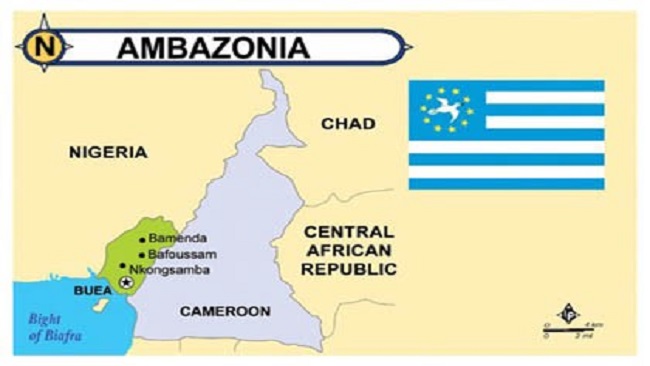One and Indivisible Cameroon sliding towards partition
No political commentator knows when President Biya is going to stop his senseless war against the people of Southern Cameroons. From Cameroon government intelligence sources, we understand that the Ambazonia Self-Defense Council Restoration Forces are in complete control of the rural areas. The French Cameroun government is determined to re-assert its sovereign authority over all Ambazonian territory, as well as the ambiguous political situation in Southern Cameroons, where the Interim Government has effectively banned all activities of the ruling CPDM party.
Over the past several months, a growing number of senior political analysts have concluded that President Biya is losing Cameroon’s brutal war. Seemingly from a position of strength some few years ago, Biya could appoint and dismiss any Anglophone political elite and he had consolidated control over West Cameroon. But things are changing so rapidly on Ground Zero and the French Cameroun army appears to have been abandoned by its main Yaoundé sponsors, all of whom are now preparing for life after Biya. As our chief correspondent in Buea recently put it, the Federal Republic of Ambazonia looks as though is here to stay.
That may be so. But the temptation to over-interpret the latest events on the battlefield has bedeviled policymakers since the Southern Cameroons uprising began. The military challenge to Biya’s rule has taken a new dimension even though some significant amounts of Ambazonian territory remain in Yaounde’s hands. If Biya is losing the war, he’s doing so at the cost of dismembering the country. Events in the Federal Republic of Nigeria points to a chaotic outcome after the presidential elections in 2019 and this will have a spillover effect on the war in Southern Cameroons. A number of factors including major diplomatic push by the Interim Government’s pragmatic approach suggest that Cameroon’s de facto partition is a more likely outcome. What might this look like? And is separation something the French Cameroonians should accept or oppose?
Since 1900, approximately two dozen conflicts ended by either de facto or de jure partition. These range from the loss of sovereign control over small territorial enclaves (e.g., Cyprus in 1964 or Somaliland in 1991) to declarations of sovereignty with full international recognition (e.g., Eritrea and Croatia in 1991, South Sudan in 2011). More recently, several Nigerian politicians have proposed a similar approach in Cameroon. This reflects deep skepticism on whether Biya will be able to reunify his so-called one and indivisible Cameroon and a recognition of the degree of divide that’s already taken place. A quick glance at the situation in Manyu, Lebialem, Belo, Bamenda, Muyenge, Kumba, Ndian, Batibo reveals a complex patchwork corresponding to discrete blocs held by the French Cameroun government, the Ambazonia Self-Defense Council Restoration Forces and armed gangs operating from Nigeria. Biya’s control over some areas in Southern Cameroons is limited to economic loyalty. For example, the French Cameroun government has continued to pay salaries to civil servants, even in areas outside its control. But over time, the Interim Government will make these constituencies become increasingly autonomous: Every Southern Cameroons County flies the Ambazonian flag, operates its own security and takes orders from the Interim Government. Administrative, judicial institutions and educational curricula are still being developed by the exiled government in the USA.
Cardinal Christian Tumi pointed out that the path to Cameroon’s demise was shaped by French intervention in the politics of the country. In the Northern Zone, the Anglophone Minister of Territorial Administration, Paul Atanga Nji and his partners have created armed groups and though small, the North West area is now buzzing with French Cameroun-funded killer squads. The precise objectives of this Minister Atanga Nji operation in the North West remain unclear.
In the South West, self-defense forces loyal to the Interim Government are exercising their influence over the Cameroon army and attacks against government forces are rampant. To be sure, Biya regime forces are extremely vulnerable and the area remains self-governing and resistant to Yaoundé authority.
It is important to stress that separation is an outcome almost every Southern Cameroonian wants including those in the Diaspora. However, the international community continues to insist on Cameroon’s unity and territorial integrity. After two years of war, the vast majority of Ambazonians are comfortable with inclusive dialogue precisely on the grounds that it would be a step towards separation.
Deep within the French Cameroun army, the fight is no longer over Southern Cameroons as a whole, but about making as much money as possible preparing for a new government after the CPDM.
By Soter Tarh Agbaw-Ebai




